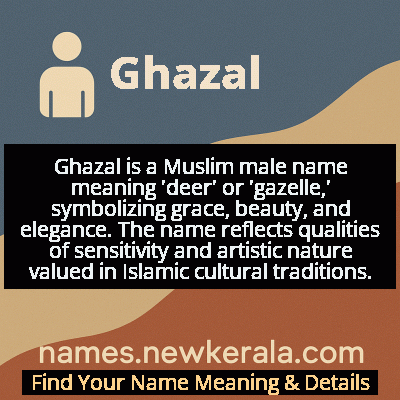Ghazal Name Meaning & Details
Origin, Popularity, Numerology Analysis & Name Meaning of Ghazal
Discover the origin, meaning, and cultural significance of the name GHAZAL. Delve into its historical roots and explore the lasting impact it has had on communities and traditions.
Name
Ghazal
Gender
Male
Origin
Muslim
Lucky Number
1
Meaning of the Name - Ghazal
Ghazal is a Muslim male name meaning 'deer' or 'gazelle,' symbolizing grace, beauty, and elegance. The name reflects qualities of sensitivity and artistic nature valued in Islamic cultural traditions.
Ghazal - Complete Numerology Analysis
Your Numerology Number
Based on Pythagorean Numerology System
Ruling Planet
Sun
Positive Nature
Leaders, ambitious, highly driven, self-reliant, innovative.
Negative Traits
Overly aggressive, domineering, impatient, selfish.
Lucky Colours
Red, orange, gold.
Lucky Days
Sunday.
Lucky Stones
Ruby, garnet.
Harmony Numbers
2, 3, 9.
Best Suited Professions
Entrepreneurs, managers, engineers.
What People Like About You
Courage, determination, leadership.
Famous People Named Ghazal
Ghazal Srinivas
Singer and Musician
Popular Indian playback singer known for blending Western and Indian musical styles
Ghazal Javed
Poet
Renowned Urdu poet known for his contributions to modern ghazal poetry
Ghazal Al-Madani
Islamic Scholar
Prominent Islamic scholar and author of several works on Islamic jurisprudence
Name Variations & International Equivalents
Click on blue names to explore their detailed meanings. Gray names with will be available soon.
Cultural & Historical Significance
In many Muslim cultures, naming a child Ghazal reflects an appreciation for nature's beauty and artistic expression, embodying ideals of elegance, sensitivity, and poetic sensibility that are highly valued in Islamic artistic traditions. The name also represents cultural continuity, linking modern bearers to centuries of literary and spiritual tradition. In contemporary Muslim communities, the name serves as a reminder of the importance of beauty, art, and spiritual seeking in daily life.
Extended Personality Analysis
Individuals named Ghazal are often perceived as graceful, sensitive, and artistically inclined. They tend to possess a natural elegance in their movements and interactions, much like the deer that their name represents. These individuals typically exhibit strong emotional intelligence, with an ability to understand and empathize with others' feelings. Their sensitive nature makes them excellent listeners and compassionate friends, though it can also mean they are easily affected by harsh environments or criticism.
Ghazals often have a creative streak, whether expressed through poetry, music, visual arts, or other forms of artistic expression. They value harmony and beauty in their surroundings and relationships, and they tend to approach life with a certain poetic sensibility that allows them to find meaning and beauty in everyday experiences. While they may appear gentle, they also possess the resilience and swift adaptability of their namesake animal when facing challenges. Their combination of sensitivity and strength makes them particularly effective in roles requiring diplomacy, creativity, and emotional understanding.
Modern Usage & Popularity
In contemporary times, Ghazal remains a popular name in Muslim communities worldwide, though it has seen some decline in recent decades as more modern names gain popularity. The name maintains strong cultural resonance in countries like Pakistan, India, Iran, and Arab nations, where traditional names with poetic and natural meanings are still valued. Among diaspora communities in Western countries, Ghazal is sometimes chosen by parents seeking to maintain cultural heritage while selecting a name with beautiful meaning and easy pronunciation. The name's connection to the ghazal poetic form ensures it retains artistic and intellectual appeal, particularly among families with literary or musical interests. While not among the most common Muslim names today, it continues to be selected by parents who appreciate its elegance, cultural depth, and the positive qualities associated with the graceful deer.
Symbolic & Spiritual Meanings
Symbolically, Ghazal represents grace, beauty, sensitivity, and spiritual aspiration. The deer or gazelle in Islamic symbolism often signifies the soul's journey toward divine love and enlightenment, appearing frequently in Sufi poetry as a metaphor for the seeker on the spiritual path. The animal's large, expressive eyes symbolize deep perception and emotional depth, while its graceful movements represent harmony with nature and inner peace. In many cultural traditions, the deer is also associated with gentleness, vulnerability, and the importance of protecting what is beautiful and pure. The name carries connotations of artistic sensitivity, emotional intelligence, and a connection to nature's rhythms. Additionally, the deer's ability to move swiftly and gracefully through challenging terrain symbolizes adaptability and resilience in the face of life's difficulties.

